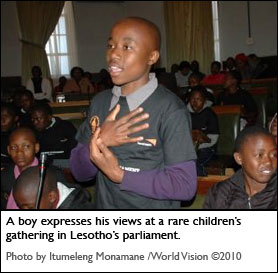Lesotho: Children discuss their concerns in parliament
By Itumeleng Monamane
More that 100 children from different parts of Lesotho spoke about various issues that affect them during a session in the country’s national parliament on 16 June to mark the Day of the African Child.

World Vision Lesotho organised the event in collaboration with a coalition on children’s rights to give children the opportunity to perform roles similar to those of the country’s Members of Parliament.
Kopano Taolana of Matsatsaneng in the Butha-Buthe district who acted as speaker of the parliament said he was happy to have a chance to occupy the speaker's seat to lead children's discussions.
Taolana said children should attend school and become responsible citizens who will work towards the development of the country.
Minister of Health and Social Welfare Dr. Mphu Ramatlapeng officially opened the mock parliamentary session and said the government would soon debate a bill that has taken into consideration important principles of participation enshrined in the United Nations Conventions on the Rights of the Child.
She said the children’s parliamentary session demonstrated the government's commitment to work together with the civil society, and more importantly, with children, to uphold the said principles.
Dr. Ramatlapeng said the bill, after adoption by the two houses of Parliament, would respond to some of the issues that affect children.
“We will listen and work with you to devise better ways of making Lesotho a country fit for children,” she told the children.
World Vision’s country director in Lesotho, Martin Silutongwe, thanked the government and the speaker for offering the children the parliament’s premises to discuss serious issues that affect their lives.
During the mock parliamentary session, children's discussions were centered around issues of child abuse in all its forms, poverty, education and the increasing numbers of orphans and vulnerable children due to HIV and AIDS pandemic.
The long-term plan of the children's parliament is to bring together children’s representatives from across the country to share ideas and experiences on issues of concern to them and participate in devising solutions to the problems that they face.
Poverty, hunger, child abuse, trafficking, exploitation, child labour and effects of the HIV and AIDS pandemic are some of the notable problems that affect children in Lesotho.
The mock parliament seeks to promote children’s participation in public affairs, governance, community development and decision-making processes at all levels.